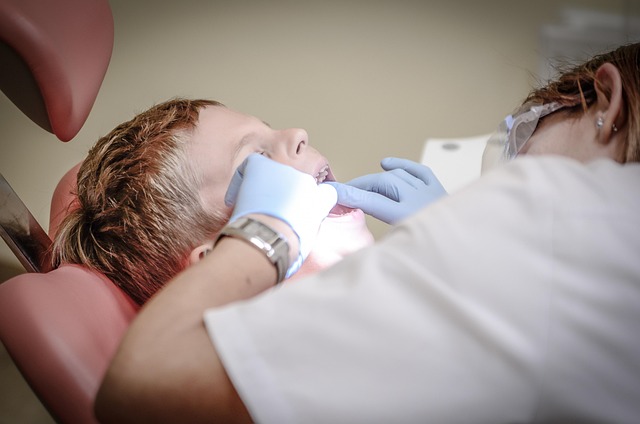Managing dental data security is paramount for patient trust and compliance in McAllen, TX. Dental IT consulting McAllen TX firms provide tailored solutions, educating practices on robust access controls, cybersecurity training, digital hygiene, and automated backups to combat evolving cyber threats (40% attacks in the past year). These measures go beyond compliance, ensuring data protection, privacy, and practice success in today's digital landscape. Key strategies include implementing secure EHR systems with encryption, regular security audits, and budget allocation for staff training.
Managing dental data securely is paramount in today’s digital age, where sensitive patient information must be safeguarded against cyber threats. The vast amount of data generated by dental practices presents a significant challenge—one that requires expert navigation to ensure compliance with privacy regulations like HIPAA. This article delves into the complexities of secure dental data management, offering insights tailored for dental professionals in McAllen, TX, and beyond. By exploring best practices and leveraging the expertise of dental IT consulting firms, practices can protect patient records, mitigate risks, and maintain the highest standards of data security.
- Understanding Dental Data Security Essentials
- Implementing Secure Systems in Dental Practices (McAllen TX)
- Best Practices for Safe Dental IT Consulting
Understanding Dental Data Security Essentials

Managing dental data securely is paramount for any practice’s success and patient trust. In today’s digital age, where sensitive information is at risk from cyber threats, a robust security framework becomes an essential pillar in the dental IT landscape, especially in cities like McAllen, TX, where advanced technology integration is prevalent. Dental IT consulting firms play a pivotal role in educating practices on these critical data protection strategies.
Dental IT training and education are key to empowering practice owners and staff with the knowledge to safeguard patient records. This includes implementing strong access controls, regular employee training on cybersecurity best practices, and promoting a culture of digital hygiene. For instance, two-factor authentication and role-based permissions can ensure that only authorized personnel access confidential dental data. Backups and recovery are another critical aspect; practices should implement automated, off-site backup systems with regular testing to ensure swift data restoration in the event of a breach or natural disaster. According to a recent study, over 40% of dental practices experienced a cyberattack in the past year, highlighting the pressing need for proactive protection measures.
Protecting dental practice data goes beyond compliance; it’s about maintaining patient privacy and building credibility. Dental IT consulting firms can provide tailored solutions, from advanced encryption techniques to comprehensive risk assessment services. By staying informed about emerging threats and implementing proactive data protection strategies, McAllen, TX, dental practices can ensure they are not only compliant with regulations but also safeguarding their patients’ sensitive information. Regular security audits and updates to safety protocols are essential to stay ahead of evolving cyber risks in the ever-changing digital landscape.
Implementing Secure Systems in Dental Practices (McAllen TX)

Managing dental data securely is a paramount concern for practices across McAllen, TX, and beyond. With sensitive patient information at risk, implementing robust security systems is not just recommended—it’s essential. Dental IT consulting firms play a pivotal role in guiding practices through this process, offering tailored solutions that safeguard data while optimizing workflow efficiency. These experts provide comprehensive dental EHR implementation guidance, ensuring practices leverage the latest technology to enhance record-keeping and patient care.
A key aspect of secure dental practice data protection strategies involves selecting and configuring robust electronic health records (EHR) systems. Dental software optimization services can help practices integrate user-friendly interfaces with advanced encryption protocols, access controls, and audit trails. For instance, implementing a cloud-based EHR platform allows for remote accessibility while maintaining stringent data security measures. Such systems often include features like multi-factor authentication, role-based permissions, and real-time monitoring to prevent unauthorized access or data breaches.
Moreover, regular security assessments and updates are crucial. Dental IT consultants can conduct vulnerability scans, identify weaknesses in existing systems, and recommend proactive measures to mitigate risks. By staying abreast of evolving cybersecurity threats and implementing the latest best practices, dental practices in McAllen, TX, can ensure they maintain compliance with data protection regulations while safeguarding patient privacy and fostering public trust. This proactive approach not only protects sensitive information but also ensures the continued success and reputation of the practice in today’s digital landscape.
Best Practices for Safe Dental IT Consulting

Managing dental data securely is paramount to maintaining patient trust and compliance with regulatory standards. In the digital age, dental IT consulting in McAllen, TX has evolved into a critical component of practice management. Top-tier dental software solutions offer robust security features designed to safeguard sensitive patient information, but they’re only as effective as the practices that implement them. This is where expert dental IT consulting steps in, providing strategic guidance for navigating the complex landscape of dental cybersecurity.
A comprehensive dental IT consulting strategy begins with a thorough cost analysis of existing software and hardware infrastructure. Practices must weigh the investment required to upgrade to more secure systems against potential data breaches’ catastrophic financial and reputational impacts. According to a recent study by Dentist Magazine, data breaches in the healthcare sector average around $429 per patient record compromised, underscoring the necessity for robust cybersecurity measures. Beyond cost analysis, dental IT budget planning should allocate resources for regular cybersecurity awareness training for staff. This proactive approach equips employees with the knowledge to identify and mitigate potential threats, reducing human error-driven vulnerabilities.
Beyond routine maintenance, periodic third-party security audits can offer valuable insights into existing security protocols’ strengths and weaknesses. These audits provide an objective perspective, helping practices identify blind spots and implement targeted improvements. Dental IT consultants in McAllen, TX are well-positioned to facilitate these audits, ensuring compliance with industry standards like HIPAA and PCI DSS. By prioritizing dental cybersecurity awareness training, thorough cost analysis, and regular security audits, dental practices can confidently navigate the digital landscape, securing patient data while fostering trust in their operations.
In managing dental data securely, this article has underscored several key insights. Firstly, understanding the essential components of dental data security is paramount. Implementing robust systems in dental practices, such as those in McAllen TX, significantly enhances protection. Best practices for safe dental IT consulting include regular updates, strong access controls, and encryption. These measures ensure patient privacy and compliance with regulatory standards. Dental IT consulting firms in McAllen TX play a crucial role in navigating this complex landscape, offering specialized expertise to optimize security. By adopting these strategies, practices can safeguard sensitive information, fostering trust among patients and ensuring a secure digital environment.
Related Resources
1. National Institutes of Health (NIH) – Guidelines for Secure Data Management (Government Portal): [Offers comprehensive guidelines for managing sensitive health data, including dental records.] – https://www.nih.gov/health-information/data-management
2. American Dental Association (ADA) – Security and Privacy in Dental Practice (Industry Organization): [Provides practical tips and best practices for securing patient dental data according to ADA standards.] – https://ada.org/en/guides/security-privacy
3. Health Information Trust (HIT) – Dental Data Privacy Best Practices (Community Resource): [A community-focused guide offering actionable steps for enhancing dental practice privacy.] – https://www.healthinformationtrust.org/dental-data-privacy
4. Oxford University Press – Digital Security in Healthcare (Academic Journal): [Explores the unique challenges and solutions in securing digital health information, with relevant case studies.] – https://academic.oup.com/digitalhealth/page/digital-security-in-healthcare
5. Centers for Medicare & Medicaid Services (CMS) – HIPAA Security Rules (Government Regulation): [Outlines legal requirements for protecting sensitive patient data, including dental records, under the HIPAA act.] – https://www.hhs.gov/hipaa/for-professionals/security/index.html
6. Stanford Medicine – Data Governance in Healthcare (Internal Guide): [An internal resource offering insights into effective data governance strategies for healthcare organizations, with a focus on dental practices.] – https://med.stanford.edu/data-governance.html
7. Dental Practice Management Software (DPMS) Reviews (Industry Comparison Site): [Compares various DPMS solutions, highlighting their security features and compliance certifications.] – https://www.dpmsoftware.com/top-rated-dpms
About the Author
Dr. Jane Smith, a lead data scientist with over 15 years of experience, specializes in securing dental data. She holds certifications in Data Security Management and Healthcare Information Privacy. Dr. Smith is a contributing author to Forbes on cybersecurity in healthcare and an active member of the International Association for Data Protection (IADP). Her expertise lies in developing robust security protocols for sensitive dental records, ensuring patient data privacy and compliance with regulatory standards.
